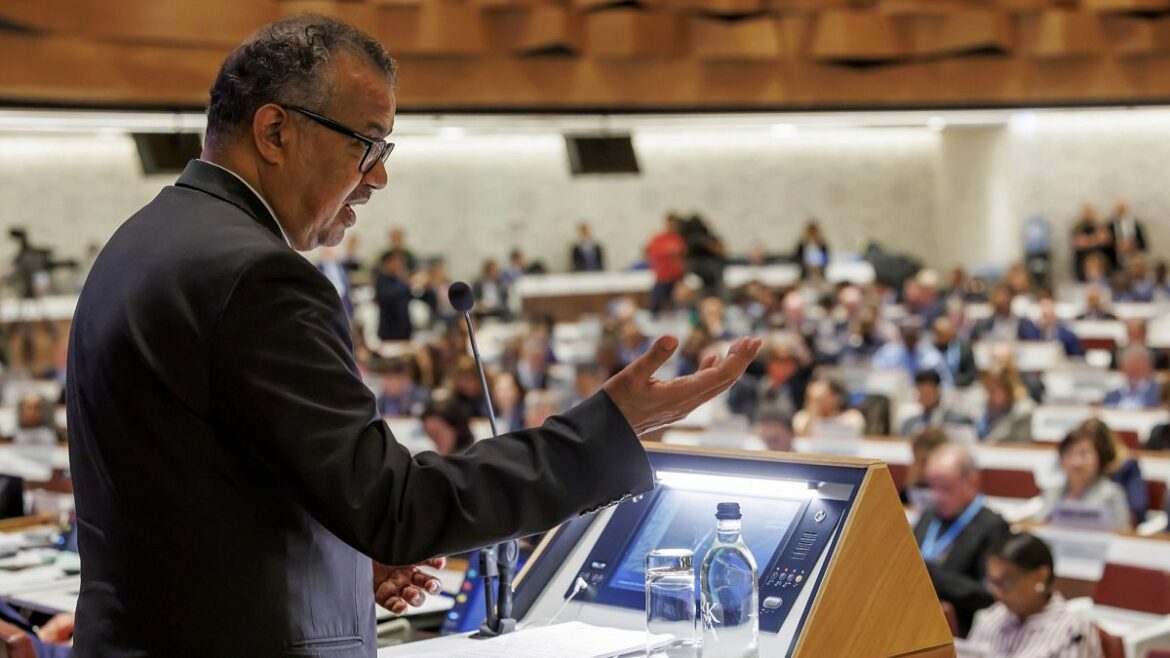Table of Contents
Massive budget cuts and an agreement to combat COVID-level health threats will be at the forefront of minds this week in Geneva as representatives from nearly every country on Earth meet for the World Health Assembly.
The assembly, convened each May, sets the World Health Organization’s (WHO) policies and budget for the upcoming year.
This year’s theme is “One World for Health” – but its spirit of camaraderie may not fully capture the mood in Geneva given that 2025 has brought deep cuts to global health programmes from major donors such as the United States, the United Kingdom, France, and the Netherlands.
With financial pressure looming large over the nine-day assembly, countries will tackle issues as wide-ranging as antibiotic-resistant superbugs, environmental toxins, polio, nuclear war, infant formula advertising, and the recruitment of health workers from abroad.
But a few key priorities will take centre stage. Here’s what to watch out for at the 2025 World Health Assembly.
WHO’s budget
The WHO has proposed shaving its 2026-2027 budget to $4.2 billion (€3.7 billion), down from the $5.3 billion (€4.7 billion) it had originally planned on. Some countries have suggested even deeper cuts, WHO chief Tedros Adhanom Ghebreyesus said.
The organisation is also short by $600 million (€527.6 billion) for 2025, WHO officials told journalists ahead of the assembly, prompting cuts to agency staff, departments, and regional offices.
The agency is scaling down its work to focus on only the “most urgent global health needs,” said Dr Catharina Boehme, WHO’s external relations chief.
But the WHO isn’t just tightening its belt. It is also asking countries to approve a 20 per cent increase in their annual dues, after they green-lit an initial 20 per cent increase in 2023.
It’s part of the organisation’s efforts to become less dependent on voluntary funding from a few big donors.
Pandemic treaty
Member states agreed last month on a treaty to boost preparedness and responses to future pandemics, and they’re expected to adopt the landmark agreement on Tuesday morning.
The treaty would require countries to improve disease surveillance, share diagnostics, medicines, and vaccines more quickly, and take steps to keep viruses from spreading from animals to people – but there are still a few sticking points.
One issue that has yet to be resolved is the creation of a new pathogen access and benefit sharing (PABS) system, in which countries would share pathogen samples and data with drugmakers in return for access to vaccines and medicines.
After they adopt the pandemic treaty, member states will have a year to wrap up negotiations on PABS. The treaty will go into force once that issue has been agreed upon.
Non-communicable diseases
In September, countries will attend a high-level meeting of the United Nations focused on noncommunicable diseases and mental health.
This week’s assembly is an opportunity for delegates to make progress toward an expected political commitment to combat chronic health problems, which kill more than 43 million people per year.
During the World Health Assembly itself, member states will consider resolutions on kidney disease, cervical cancer, blindness and other forms of vision impairment, and hearing loss.
“We’re not sure how much movement will be made, though [we] remain optimistic,” Jonny Barty, chief executive of the health and education consultancy Acasus, told Euronews Health.
Climate change and health
Last year, member states instructed the WHO to come up with a plan to address climate change as a health issue.
They’ll now vote on the proposal, which calls for countries to curb manufacturing emissions and incorporate health into their climate commitments under the Paris Agreement.
But climate groups aren’t entirely happy with the latest available draft. The non-profit Global Climate and Health Alliance, for example, wanted stronger measures tackling the role of fossil fuels in climate change.
“What we need governments and the public to understand is that people’s health will ultimately pay the price for inaction,” Rosie Tasker, the group’s clean air liaison, told Euronews Health.
Global dementia strategy
Countries will decide whether to extend a global action plan on dementia through to 2031. The strategy, which first passed in 2016 and is set to expire this year, set goals that countries have not met on dementia, which affects about 57 million people worldwide.
For example, the WHO wanted 75 per cent of its member states to develop national plans to address dementia, but by 2024, only 26 per cent – 50 countries – had met that target.
Gaps also remain in access to dementia diagnosis, treatment, and caregiving, the organisation said.
What’s pledged is one thing, what’s funded is another
Nicoletta Dentico, who leads the global health programme for the Society for International Development (SID), told Euronews Health that while member states are generally expected to approve the measures they’ll review this week, whether they lead to anything tangible “depends on the money… because of funding cuts”.
Meanwhile, Barty said countries would benefit from clear-cut strategies to help them address key issues like vaccination, maternal health, climate change, and primary care.
“What matters isn’t what’s pledged this week – but what’s still being delivered six months from now,” Barty said.

